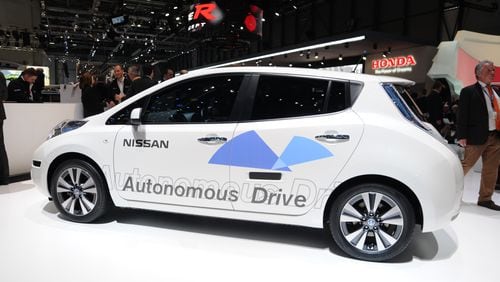The notion of driverless cars or autonomous vehicles appears more and more often in headlines. Uber is experimenting with (and sometimes failing with) the technology. More and more high-end cars have some iteration of the liberating feature. Clark Howard is all about it!
But autonomous vehicles still seem like machines one would see meandering Google’s campus in Silicon Valley, not shuffling up and down a crowded urban highway. As the private sector furiously innovates self-driving cars, the U.S. government is getting equally prepared.
Faye DiMassimo heads the City of Atlanta’s TSPLOST management and also the RENEW Atlanta project. RENEW Atlanta’s menu of projects is large and varied, but the biggest piece involves vast improvements on North Avenue in Midtown.
“It’s a highly congested corridor, anchored on once side by Georgia Tech and on the other end by Ponce City Market,” DiMassimo says in a 4th floor conference room in RENEW’s auspices in Atlanta’s City Hall. She says that by the time of the North Avenue project’s ribbon-cutting in September, it will be a smart corridor. “”The signals will be smart, the lighting will be smart,” and, she says, the pavement will have markings and sensors that can talk to each other (just as self-driving cars can) and talk with the traffic signals to make vehicular, bicycle and pedestrian traffic (namely near the Beltline) move more safely and efficiently.
Once “smart” North Avenue is open, the project’s next phase is even more innovative.
“We got 13 proposals from around the world to host an autonomous vehicle demonstration there!”
DiMassimo, the former Cobb DOT head, whom Atlanta Mayor Kasim Reed hired a year ago, visited such a demonstration in Pittsburgh. She says that Uber and other demonstrators sent autonomous vehicles down alleyways, in inclement weather, and in other various scenarios. The machines performed well.
Safety, not simply convenience, is the number one reason that government on all levels is interested in autonomous cars. When DiMassimo and other planners studied data on North Avenue, they found, “There are a lot of rear-end accidents in that corridor and that’s because the traffic flow is not always smooth, people get impatient, and are driving distracted. Autonomous cars don’t do that.”
The USDOT is actively seeking proving grounds for these cars and DiMassimo and RENEW have submitted North Avenue as one. And the interest in the iconic Atlanta road’s upgrade has drawn international attention.
The City of Atlanta applied for the Safer Roads Challenge - a worldwide innovation initiative - and the North Avenue project was the only North American site chosen. DiMassimo says officials with huge tech firms like IBM chose a place in China, one in Spain … and this one in Midtown.
The biggest concerns, DiMassimo says, with autonomous vehicle technology are the speed of implementation - can infrastructure and technology keep up - and the susceptibility for the cars or infrastructure to hacking. Grants and interest from USDOT and the Safer Roads Challenge help strengthen Atlanta for self-driving vehicles.
Preparation exits outside of the North Avenue project. DOT officials say that the reversible lanes and managed lanes they are building around town are being made with autonomous vehicles in mind. The early years of those innovative automobiles might see them traveling in their own lanes.
Mark Arum has talked about self-driving cars numerously in this space. The idea is not that far down the line and different layers of both the government and the private sectors are working together to help bring it to fruition.
About the Author






